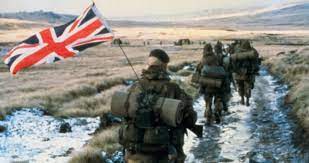
This coming Tuesday, 14th June, marks the 40th anniversary of the end of the Falklands War, the conflict between the UK and Argentina. I suspect for those of us of a certain age, this is poignant. I was a 20-year old university student at the time. A few weeks before the war broke out, I was at the Imperial War Museum in Duxford when, coincidentally, a Vulcan bomber was brought into land; retired from service to join the museum collection. Whilst the Cold War was very active at that time, this seemed a throw-back to another age. Little did I imagine thatsix weeks later one of the Vulcans still in service would be used in anger, flying half-way round the world to bomb an airfield on the Falklands. For the first time in my life, I lived in a country that was, effectively at war, albeit in a conflict very remote from Cambridge where I was living. As students, we would wait on the nightly briefings from the Ministry of Defence, with a mixture of anticipation and fear.
War always raises difficult questions for people of faith. Christ chose a path of non-resistance to the powers of his day, to win a once-for-all victory over evil. Even in that simple sentence, there is a clash between actions of peace and words that speak of war. The same Jesus who went peacefully to his death used a whip to clear the temple of money-traders. Whilst there are Christian traditions that reject war under any circumstances, the majority of voices accept that in a fallen world, sometimes we do need to resort to arms to prevent or correct injustice. Whilst there were some dissenting voices at the time, I suspect most would now accept that the conflict in the Falklands was a just use of force, to liberate the islanders and reverse an act of violence. I think it was Oscar Wilde who wrote “the truth is rarely pure and never simple”; sometimes we have to muddle through moral decisions as best we can and pray that God will forgive us if we get them wrong.